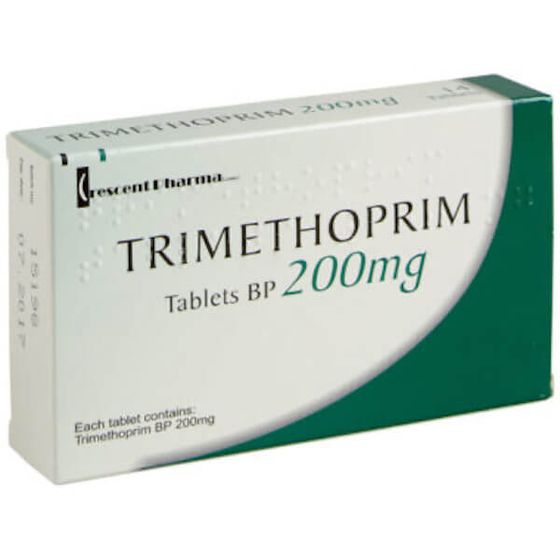- Home
- Online Doctor
- Cystitis (UTI)
- Trimethoprim
Trimethoprim Tablets

Trimethoprim is a well-established and effective antibiotic commonly prescribed in the UK for the treatment of urinary tract infections (UTIs), including cystitis. It belongs to a class of medicines known as anti-infectives and works by selectively targeting and eliminating the bacteria responsible for your infection.
You must complete a short online consultation so that our prescriber can ensure that the treatment is suitable for you.
| Product Name: | Trimethoprim |
|---|---|
| Manufacturer: | Accord Healthcare Limited |
| Active Ingredient: | Trimethoprim |
| Administration: | Oral tablet |
| Presentation: | Tablet |
| Available Strengths: | 100mg, 200mg |
| Prescription Required: | Yes |
| Dosage: | Typically twice daily |
| Suitable for pregnancy? | No |
| Use with alcohol: | Generally advised to avoid |
| Treatment Duration | Typical Use | Prescription Required |
|---|---|---|
| 3-14 days | Acute UTI treatment | Yes |
| Long-term | UTI prevention | Yes |
| Trimethoprim is a prescription-only antibiotic that treats urinary tract infections. It belongs to the antibacterial class of medications. Please consult with your healthcare provider before starting this medication. | ||
| This treatment requires an online consultation for review by our medical team. The decision to supply the specific treatment and quantity requested will be based on whether our medical team are satisfied that it will be safe, appropriate, and effective. | ||
What is Trimethoprim and How Does It Work Against Bacteria?
Trimethoprim is a bacteriostatic antibiotic, meaning it stops bacteria from growing and multiplying. It is classified as a broad-spectrum agent, making it effective against a wide range of bacteria, particularly those that commonly infect the urinary tract, such as Escherichia coli (E. coli).
Its mechanism of action is highly specific. Bacteria need folate (a B vitamin) to produce DNA and replicate. Unlike humans who get folate from their diet, bacteria must synthesise it themselves. Trimethoprim works by precisely inhibiting a bacterial enzyme called dihydrofolate reductase. This blockade disrupts the production of tetrahydrofolate, a crucial component in the folate synthesis pathway. Without this, the bacteria cannot produce genetic material and essential proteins, effectively halting their growth and leading to their eventual death. This targeted approach makes it a valuable tool in fighting uncomplicated urinary tract infections.
Crucial Information Before You Start Taking Trimethoprim
To ensure your safety, it is vital to discuss your full medical history with your doctor. Do not take Trimethoprim and inform your doctor immediately if any of the following apply to you:
- Allergy: You are allergic to trimethoprim or any of the other ingredients listed in this leaflet (see section 6).
- Blood Disorders: You have any known blood disorder (e.g., anaemia).
- Pregnancy: You are pregnant or trying to become pregnant. Trimethoprim is not recommended during pregnancy.
- Severe Liver Disease: You have severe liver problems.
- Newborns: It should not be given to premature babies or newborns in their first few weeks of life.
Warnings and Precautions for Trimethoprim Use
Talk to your doctor or pharmacist before taking Trimethoprim if you have:
- Kidney Disease: Impaired kidney function may require a dose adjustment.
- Folate Deficiency: A pre-existing deficiency of folic acid may be exacerbated, potentially leading to anaemia.
- Diabetes: Particularly if poorly controlled.
Important Note on Potassium: Trimethoprim can increase potassium levels in the blood (hyperkalaemia). This risk is higher in patients with kidney problems, poorly controlled diabetes, or those taking certain medications like potassium-sparing diuretics or ACE inhibitors. Symptoms of high potassium can include muscle cramps, irregular heartbeat, nausea, and dizziness. Your doctor may monitor your potassium levels with blood tests during treatment.
Other Medicines and Trimethoprim Interactions
Always inform your doctor of all medicines you are taking, including over-the-counter drugs and herbal remedies. Key interactions include:
- Warfarin: Trimethoprim may enhance the blood-thinning effect of warfarin, increasing the risk of bleeding.
- Phenytoin: Levels of this epilepsy medication may be increased by Trimethoprim.
- Methotrexate: The risk of blood disorders may be increased when taken with Trimethoprim.
- ACE Inhibitors/Angiotensin II Receptor Blockers (ARBs): (e.g., Ramipril, Losartan) can increase the risk of high potassium levels.
- Diuretics: Specific diuretics like spironolactone, amiloride, or triamterene also increase potassium and should be used with caution.
- Digoxin: Used for heart conditions, its levels may be affected.
- Repaglinide: (A diabetes medicine) - its effect may be enhanced.
This is not an exhaustive list. Always check with your doctor or pharmacist before combining medicines.
Pregnancy, Breast-feeding, and Lactose Intolerance
Pregnancy: Trimethoprim is not recommended during pregnancy, especially in the first trimester, due to potential risks to the foetus.
Breast-feeding: Small amounts of Trimethoprim pass into breast milk. Consult your doctor for advice on whether to continue breastfeeding or stop taking the medicine.
Lactose: This medicine contains a small amount of lactose. If you have been told by your doctor that you have an intolerance to some sugars, contact your doctor before taking this medicine.
How to Take Trimethoprim for Effective Treatment
Always take this medicine exactly as your doctor has told you. The dose and duration will depend on the type and severity of your infection and your age.
- Swallow the tablet whole with a glass of water.
- It can be taken with or without food, as this does not affect its absorption.
- Space your doses evenly throughout the day. For example, if you are taking it twice daily, take one dose in the morning and one in the evening.
- Complete the full course of antibiotics, even if you start to feel better after a few days. Stopping early can allow the infection to return and contribute to antibiotic resistance.
What to Do If You Miss a Dose or Take Too Much Trimethoprim
If you forget to take a dose: Take it as soon as you remember, unless it is almost time for your next dose. In that case, skip the missed dose and continue with your regular schedule. Do not take a double dose to make up for a forgotten one.
If you accidentally take too much (overdose): Contact your doctor or go to the nearest hospital Accident and Emergency department immediately. Take the medicine pack with you so the medical staff can identify what you have taken.
Understanding the Potential Side Effects of Trimethoprim
Like all medicines, Trimethoprim can cause side effects, although not everybody gets them. It is important to be aware of them so you can seek medical advice if necessary.
STOP taking Trimethoprim and seek immediate medical help if you experience any signs of a severe allergic reaction:
- Difficulty breathing, wheezing, or swelling of the face, lips, tongue, or throat.
- Severe skin reactions like blistering, peeling, or a painful red rash.
- Chest pain, fainting, or collapse.
- Severe, persistent diarrhoea (which may be bloody) – this could be a sign of colitis.
- Sudden, severe abdominal pain (signs of pancreatitis).
Other Possible Side Effects
Common (May affect up to 1 in 10 people):
- Feeling sick (nausea) or being sick (vomiting)
- Diarrhoea
- Headache
- Skin rashes or itching (pruritus)
- Fungal infections like thrush
Uncommon to Rare:
- Increased potassium levels in the blood (hyperkalaemia)
- Anaemia, sore throat, or mouth ulcers (due to changes in blood cells)
- Dizziness, tiredness
- Liver function changes (may show as jaundice - yellowing of the skin/eyes)
- Depression, confusion, or sleep disturbances
This is not a complete list. For a full overview of side effects, please refer to the official Trimethoprim Patient Information Leaflet (PIL) on the medicines.org.uk website. If you get any side effects, talk to your doctor, pharmacist, or nurse. This includes any possible side effects not listed. You can also report side effects directly via the Yellow Card Scheme.
Detailed Trimethoprim Dosage Guidelines for All Ages
The following dosage information is a guide. Your doctor will determine the exact dose that is right for you.
Standard Treatment Dose for Infections
- Adults and children over 12 years: The usual dose is 200mg twice daily.
- Children aged 6 to 12 years: The usual dose is 100mg twice daily.
- Children under 6 years: A more suitable liquid formulation is usually recommended instead of tablets.
For severe or sudden infections, such as uncomplicated cystitis, treatment typically lasts between 3 to 14 days. Your doctor may instruct you to take a double dose (400mg) for your first dose to quickly achieve effective blood levels of the antibiotic.
Long-Term Prevention with Trimethoprim
For the prevention of recurrent UTIs, a much lower, single daily dose is used:
- Adults and children over 12 years: 100mg once daily, usually taken at night.
- Children aged 6 to 12 years: 50mg once daily at night.
Dosage in Elderly Patients and Those with Kidney Problems
Doses may be reduced in elderly patients or those with impaired kidney function. Your doctor will calculate the correct dose based on your kidney function test results.
Trimethoprim Interactions, Storage, and Composition
How to Store Your Trimethoprim Medication
- Keep this medicine out of the sight and reach of children.
- Store in a dry place below 25°C.
- Do not use this medicine after the expiry date printed on the carton and blister strip.
- Do not throw away medicines via wastewater or household waste. Return any unused medication to your pharmacy for safe disposal. This helps to protect the environment.
What is in Trimethoprim Tablets?
- The active substance is Trimethoprim. Each tablet contains 200mg of Trimethoprim.
- The other ingredients are Lactose monohydrate, Povidone K-25, Crospovidone, Sodium starch glycolate (Type A), and Magnesium stearate.
What the Tablets Look Like
Trimethoprim 200mg Tablets are white, flat, bevelled-edged tablets, engraved with 'MT200'. They are available in containers of 50, 100, 500, 1000, and 5000 tablets, or in blister packs of 6, 14, and 28 tablets.
Frequently Asked Questions About Trimethoprim
How long does it take for Trimethoprim to work for a UTI?
You should start to feel symptom relief within 24 to 48 hours of starting the course. However, it is crucial to complete the entire course of antibiotics as prescribed by your doctor, even if you feel better, to ensure the infection is completely cleared and to prevent recurrence or resistance.
Can I drink alcohol while taking Trimethoprim?
It is generally advised to avoid alcohol while taking any antibiotics, including Trimethoprim. While there is no direct 'disulfiram-like' reaction (severe nausea and vomiting) known with Trimethoprim, alcohol can exacerbate some side effects like nausea and dizziness and may place additional stress on your liver, which is processing the medication. It's best to err on the side of caution until you have finished your course.
Why might Trimethoprim not be working for my UTI?
If your symptoms are not improving after 2-3 days, or if they are getting worse, you should contact your doctor. The bacteria causing your infection may be resistant to Trimethoprim. This is why a urine test is sometimes needed to confirm the type of bacteria and the most effective antibiotic to treat it. Your doctor can then prescribe an alternative medication.
Is Trimethoprim the same as Amoxicillin or Nitrofurantoin?
No, they are different classes of antibiotics. Amoxicillin is a penicillin, Nitrofurantoin is a nitrofuran antibiotic, and Trimethoprim is a diaminopyrimidine. They all work in different ways to kill bacteria. The choice of antibiotic depends on the specific bacteria causing the infection, local resistance patterns, and patient factors like allergies. They are not interchangeable.
Clinical References and Sources
This content has been compiled using the manufacturer's Patient Information Leaflet (PIL) and information from authoritative UK health sources.
- NHS Trimethoprim Guide - Official NHS information on uses, key facts, and side effects.
- StatPearls Publishing - Detailed clinical information on Trimethoprim's mechanism and use.
- PMC Article on Antibiotic Use - Research on antibiotic prescribing and resistance.
- British Journal of General Practice - Historical and clinical context for Trimethoprim use.
Where to Buy Trimethoprim in the UK
Secure Prescription & Next-Day Delivery
Trimethoprim is a prescription-only medicine (POM). At Chemist Doctor, you can complete a quick online consultation with a UK-registered GP. If deemed appropriate for your condition, a prescription will be issued, and our GPhC-registered pharmacy will dispatch your medication for discreet next-day delivery.
Our Trimethoprim service combines competitive pricing with strict adherence to MHRA safety standards, ensuring your medication is dispensed through GPhC-registered pharmacies. Every purchase includes discreet packaging and a GDPR-compliant consultation process.
Our clinical team ensures:
- Comprehensive medical history review
- UTI symptom assessment
- Drug interaction checks
- Personalised dosing guidance
Always consult your GP before starting antibiotic treatment. Not recommended for children under 6 or those with specific contraindications.
Getting your medication is quick and easy with our simple 4-step process:
Start Consultation
Complete our brief health questionnaire about your medical history and current health.
Medical Review
UK-registered clinicians review your consultation for safe prescribing.
Pharmacy Processing
If approved, our partner pharmacy prepares your medication.
Fast Dispatch
Your order is dispatched via your chosen delivery method.
What does the online consultation involve?
You'll answer questions about your medical history and current health to ensure safe prescribing. Honest responses are vital for your safety.
How do I reorder medication?
Use the login details emailed after your first order to access your account and reorder.
How does the secure chat portal work?
Clinicians may contact you via your account's chat portal to discuss your treatment. Respond securely within your account.
At Chemist Doctor, we respect your privacy and ensure complete discretion at every step.
Discreet Packaging
All orders are sent in tamper-evident, plain white boxes sealed within anonymous grey mailing bags.
Secure Data
Your personal and medical information is kept strictly confidential with SSL encryption.
Private Consultations
All consultations are conducted privately by UK-registered clinicians.
Anonymous Billing
Credit card statements show a neutral descriptor with no reference to medications.
Will my GP be informed about my order?
Only with your consent. We recommend updating your GP directly for seamless care.
We offer two reliable delivery options to suit your needs:
| Service Type | Delivery Speed | Order Cut-off | Carrier |
|---|---|---|---|
| Standard Delivery | 2-3 business days | No cut-off | Royal Mail |
| Premium Next-Day Delivery | Next business day | 3 PM weekdays | Royal Mail 24 |
Next-day delivery guarantee applies to orders approved before 3 PM to these regions:
- England
- Scotland
- Wales
- Northern Ireland
Service Restrictions: We currently cannot deliver to: Republic of Ireland, Continental Europe, USA, or Canada
Is packaging discreet?
Yes. All orders are shipped in plain, unmarked packaging via tracked courier services.
Do I need to stay home for delivery?
No. You'll receive a tracking number to monitor your parcel's progress.
Do you deliver on weekends or bank holidays?
Deliveries occur Monday–Friday only. We do not ship on weekends or UK bank holidays.
What should I do if my order hasn't arrived?
Use your tracking number to locate the parcel or contact our support team for assistance.
Can I receive delivery updates via SMS?
Yes. Provide your mobile number at checkout for courier updates. We will not use it for marketing purposes.
Credit/Debit Cards
Visa, Mastercard, Maestro, American Express
Secure 3D authentication
Bank Transfer
Select at checkout for unique reference details
Order processes once payment clears
We use SSL encryption and PCI DSS compliance to secure transactions. Learn more in our Privacy Policy.
How long do refunds take to process?
Card payments: Refunds appear in 3–5 days.
Bank transfers: We'll contact you for account details to return funds.
Why was my order declined?
Declined orders are not charged. Card authorisations release funds within 3–5 days (contact your bank for details).
Can I return prescription medication?
No. UK law prohibits returns of dispensed prescription treatments for safety reasons.
Reviews being updated...
Have you used our services? Share your experience










